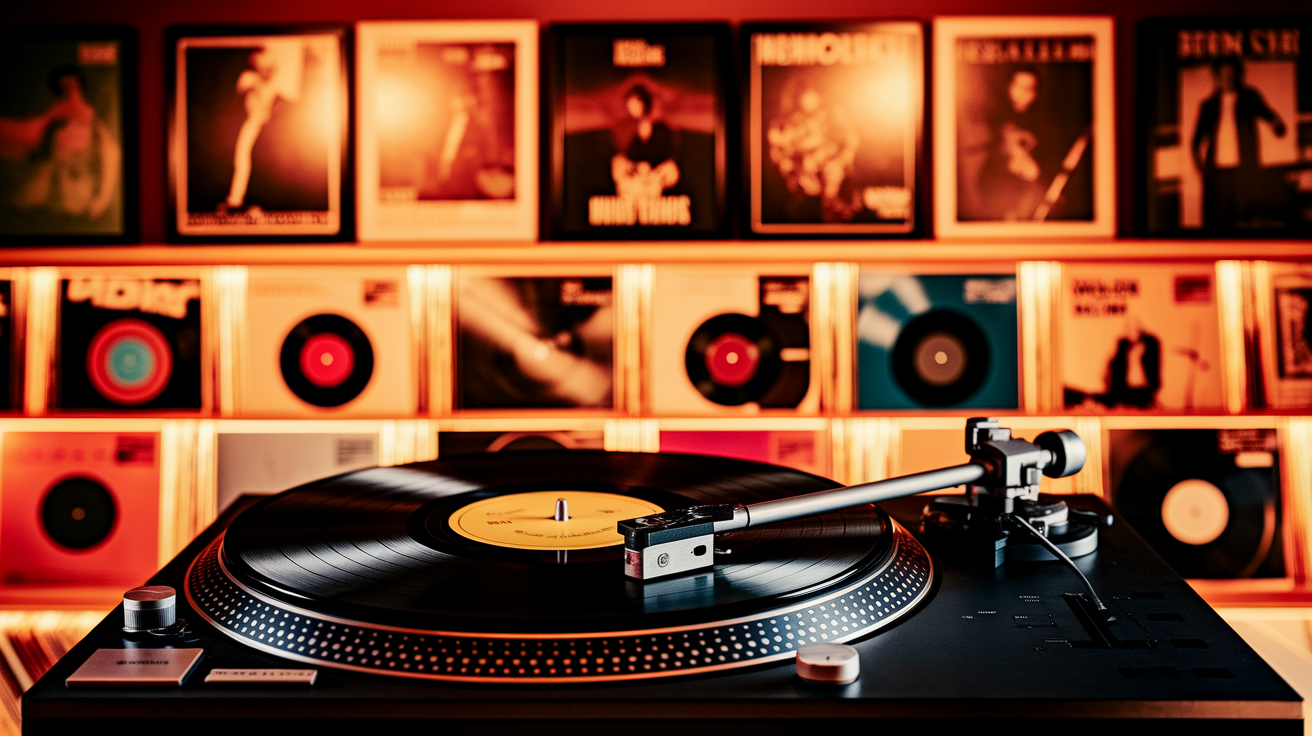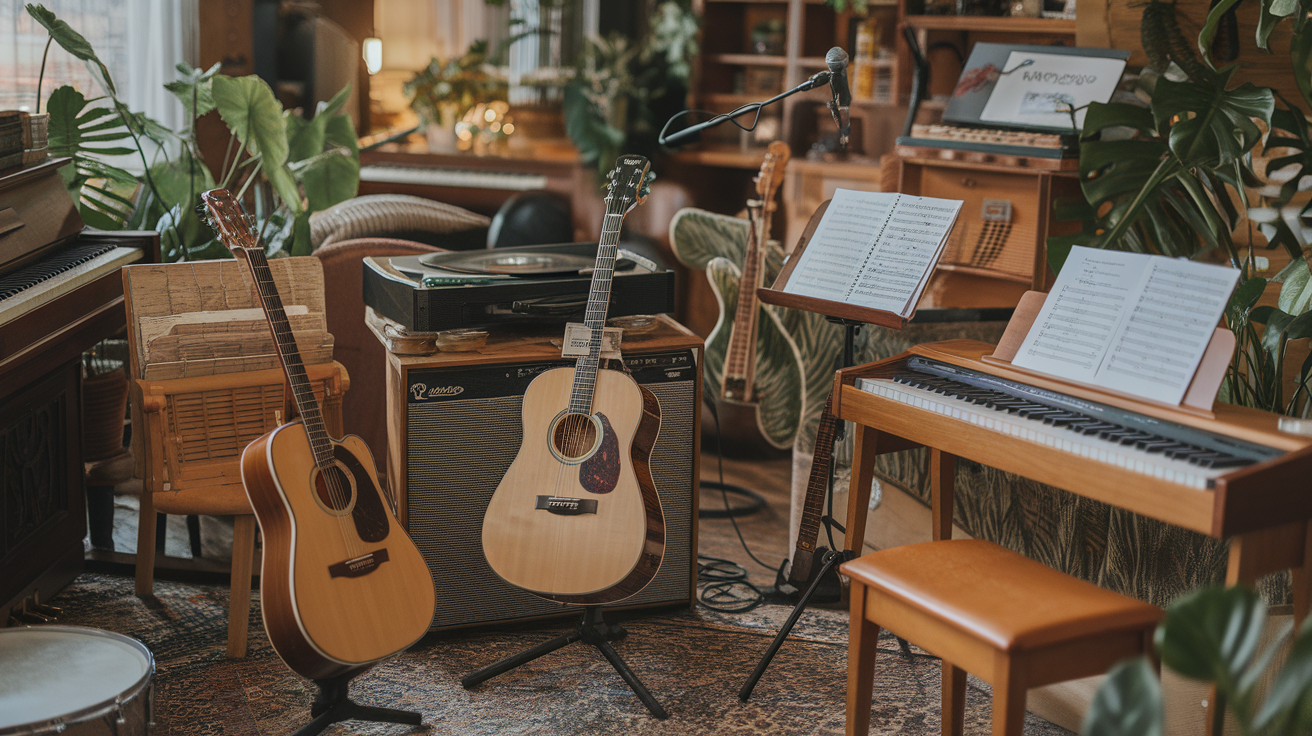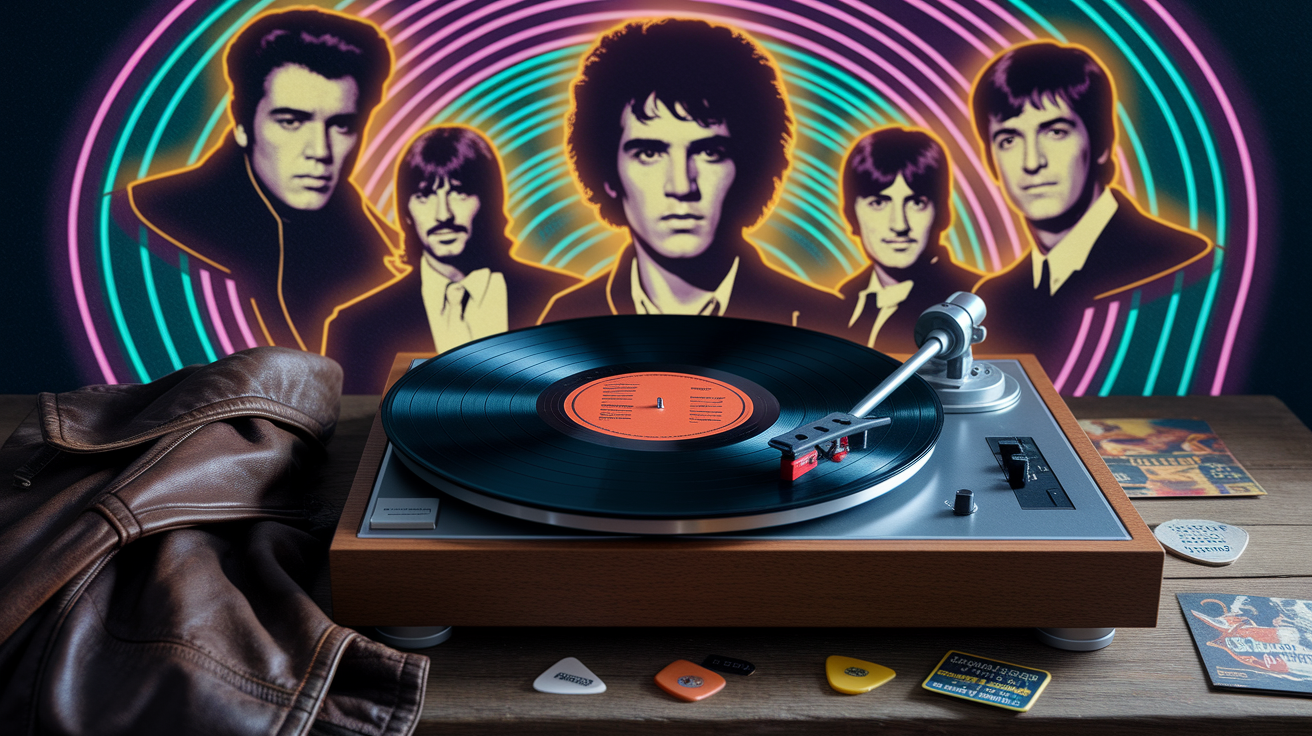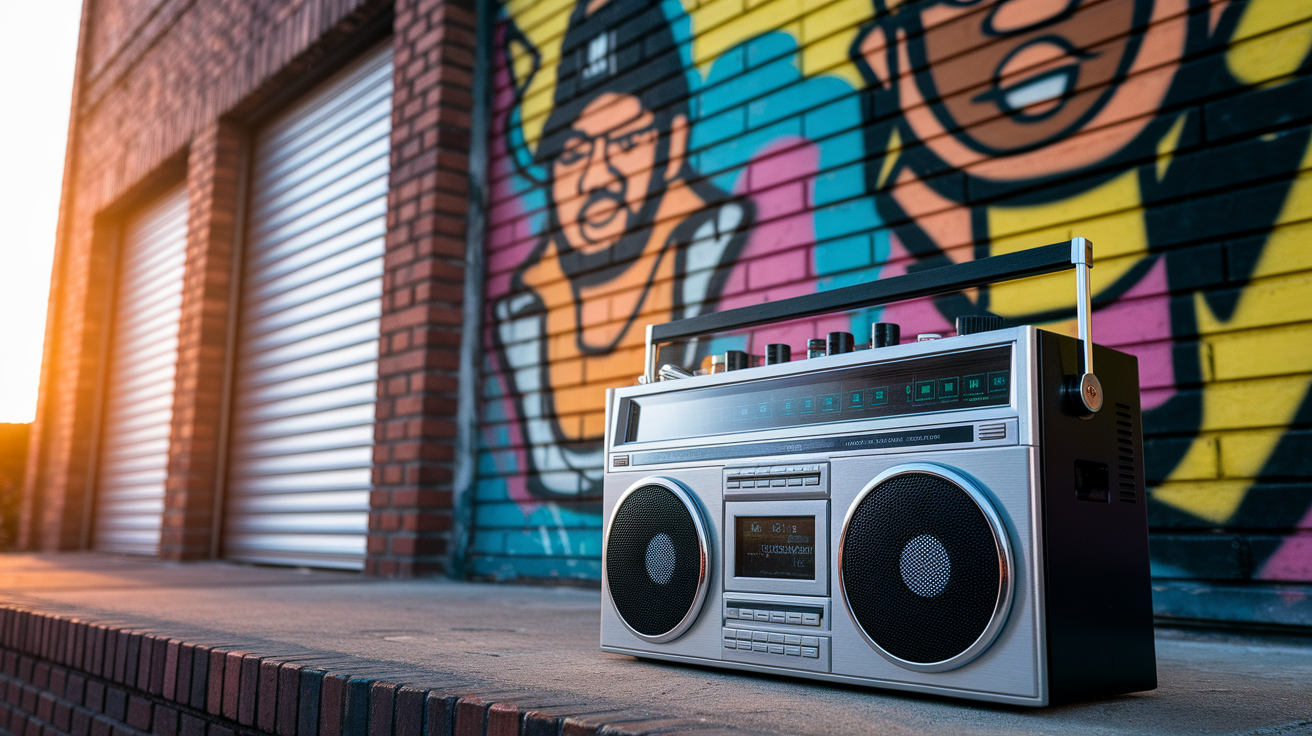222 Music Trivia Questions for Every Music Fan

Music has the power to transport us across time and evoke memories from every stage of our lives.
If you’re humming along to your favorite pop song, headbanging to a classic rock anthem, or vibing to the latest hip-hop track, music is a universal language that connects us all.
This comprehensive collection delves beyond surface-level questions to offer insightful perspectives on music production, industry history, cultural movements, and the personal stories behind your favorite songs.
The questions are designed to be both educational and entertaining, offering something for casual music fans and serious enthusiasts alike.
Some will test your knowledge of well-known facts, while others will introduce you to surprising stories and lesser-known details about famous artists and songs.
This variety ensures that everyone can participate and learn something new, regardless of their musical background or preferred genres.
Why Music Trivia Questions Are Perfect for Any Gathering
Music trivia holds a special place in entertainment because it taps into our shared cultural experiences and personal memories, evoking a sense of nostalgia and unity.
Unlike other trivia categories that might favor specific knowledge areas, music questions connect with people across all backgrounds, ages, and interests.
Music questions also work well because they can be adapted to any group’s preferences and knowledge level.
You can focus on specific decades, mix genres for variety, or create themed rounds around artists or musical movements.
This flexibility makes music trivia suitable for a range of occasions, from casual family gatherings to competitive pub quiz nights.
General Music Knowledge Questions

Start your trivia experience with some foundational music questions that every music lover should know.
This section encompasses a broad range of musical topics, from fundamental music theory and instrument knowledge to notable concerts and music history milestones.
1. How many valves does a standard trumpet have?
Answer: 3
2. What does the musical term “forte” mean?
Answer: Loud
3. Which city is known as the birthplace of jazz?
Answer: New Orleans
4. How many lines are on a musical staff?
Answer: 5
5. What is the lowest male singing voice called?
Answer: Bass
6. Which instrument family does the saxophone belong to?
Answer: Woodwind
7. What does “BPM” stand for in music?
Answer: Beats Per Minute
8. How many movements are typically in a classical symphony?
Answer: 4
9. What is the highest female singing voice called?
Answer: Soprano
10. Which clef is used for higher-pitched instruments?
Answer: Treble Clef
11. What is a group of four musicians called?
Answer: Quartet
12. How many strings does a standard violin have?
Answer: 4
13. What does “crescendo” mean in music?
Answer: Gradually getting louder
14. Which note comes after G in the musical alphabet?
Answer: A
15. What is the distance between two identical notes called?
Answer: Octave
16. How many pedals does a standard piano have?
Answer: 3
17. What does “allegro” indicate in musical tempo?
Answer: Fast and lively
18. Which instrument is known as the “king of instruments”?
Answer: Pipe Organ
19. What is a musical composition for a solo instrument called?
Answer: Solo
20. How many holes does a standard flute have?
Answer: 16
21. What does “pianissimo” mean?
Answer: Very soft
22. Which family does the tuba belong to?
Answer: Brass
23. What is the term for music written in a minor key?
Answer: Minor Scale
24. How many reeds does an oboe use?
Answer: 2 (Double Reed)
25. What does “staccato” mean in music?
Answer: Short and detached
26. Which percussion instrument is also called a kettledrum?
Answer: Timpani
27. What is the term for the speed of music?
Answer: Tempo
28. How many strings does a standard guitar have?
Answer: 6
29. What does “andante” indicate for tempo?
Answer: Walking pace
30. Which instrument uses a bow to create sound?
Answer: Violin (or other string instruments)
31. What is a musical phrase that repeats called?
Answer: Motif
32. How many keys does a full-size piano have?
Answer: 88
33. What does “diminuendo” mean?
Answer: Gradually getting softer
34. Which brass instrument has a slide?
Answer: Trombone
35. What is the term for multiple notes played simultaneously?
Answer: Chord
36. How many strings does a standard bass guitar have?
Answer: 4
37. What does “legato” mean in musical performance?
Answer: Smooth and connected
38. Which percussion instrument is played with mallets?
Answer: Xylophone
39. What is the term for the main melody in a piece?
Answer: Theme
40. How many valves does a French horn typically have?
Answer: 3
41. What does “ritardando” indicate?
Answer: Gradually slowing down
42. Which instrument is considered the backbone of the rhythm section?
Answer: Drums
43. What is the term for improvised music?
Answer: Improvisation
44. How many strings does a standard cello have?
Answer: 4
Pop Music Through the Decades

Pop music has been the soundtrack to countless lives, evolving and adapting with each generation. This section takes you through pop music history, from early pioneers to today’s streaming sensations.
45. Which decade is known as the “Golden Age of Pop”?
Answer: 1960s
46. What instrument is most associated with 1980s pop music?
Answer: Synthesizer
47. Which format revolutionized music consumption in the 1980s?
Answer: Compact Disc (CD)
48. What does “Top 40” refer to in pop music?
Answer: The 40 most popular songs on radio
49. Which decade saw the rise of MTV?
Answer: 1980s
50. What is the term for a song that becomes popular again years later?
Answer: Revival or comeback hit
51. Which technology changed how people found music in the 2000s?
Answer: Internet/Digital downloads
52. What does “crossover hit” mean?
Answer: A song popular in multiple genres
53. Which decade popularized the concept of boy bands?
Answer: 1990s
54. What is Auto-Tune primarily used for?
Answer: Pitch correction
55. Which platform revolutionized music streaming in the 2010s?
Answer: Spotify
56. What does “spreading quickly” mean in modern music context?
Answer: Spreading rapidly through social media
57. Which decade saw the birth of music videos?
Answer: 1970s
58. What is a “hook” in pop music?
Answer: A catchy musical phrase
59. Which format dominated the 1990s music market?
Answer: Compact Disc
60. What does “remix” mean?
Answer: A modified version of an original song
61. Which decade introduced the concept of “Girl Power”?
Answer: 1990s
62. What is a “one-hit wonder”?
Answer: An artist known for only one popular song
63. Which technology allows artists to record at home?
Answer: Digital Audio Workstations
64. What does “featuring” mean on a song credit?
Answer: Guest artist collaboration
65. Which decade saw the rise of reality TV singing competitions?
Answer: 2000s
66. What is “sampling” in music production?
Answer: Using portions of existing recordings
67. Which format was popular before CDs?
Answer: Cassette tapes
68. What does “acoustic” version mean?
Answer: Performed with non-electronic instruments
69. Which decade introduced music television?
Answer: 1980s
70. What is a “tribute song”?
Answer: A song honoring someone or something
71. Which technology replaced physical music sales?
Answer: Digital streaming
72. What does “unplugged” mean in music?
Answer: Acoustic performance
73. Which decade saw the rise of social media in music promotion?
Answer: 2000s
74. What is a “cover version”?
Answer: A new recording of an existing song
75. Which format preceded vinyl records?
Answer: 78 RPM shellac records
76. What does “EP” stand for?
Answer: Extended Play
77. Which decade introduced portable music players?
Answer: 1980s (Walkman)
78. What is “pitch shifting”?
Answer: Changing the pitch of recorded audio
79. Which technology enabled music sharing in the early 2000s?
Answer: Peer-to-peer networks
80. What does “remaster” mean?
Answer: Improving the sound quality of older recordings
81. Which decade saw the decline of physical music sales?
Answer: 2000s
82. What is a “demo” recording?
Answer: A rough recording to showcase a song
83. Which format dominated the 1970s?
Answer: Vinyl records
84. What does “multitrack” recording allow?
Answer: Recording different parts separately
85. Which decade introduced the concept of music downloading?
Answer: 1990s
86. What is “overdubbing”?
Answer: Adding new parts to an existing recording
87. Which technology made home recording affordable?
Answer: Digital recording equipment
88. What does “single” refer to in music releases?
Answer: A song released separately from an album
89. Which decade saw the rise of music streaming services?
Answer: 2000s
Rock Music Legends and Anthems

Rock music has been a driving force in popular culture for decades. This section celebrates the legends who built the foundation of rock music and continue to influence artists today.
90. What instrument is central to rock music?
Answer: Electric guitar
91. Which decade is considered the birth of rock and roll?
Answer: 1950s
92. What does “power chord” refer to?
Answer: A chord with root and fifth notes
93. Which city is known as the “Motor City” and the birthplace of Motown?
Answer: Detroit
94. What is a “guitar solo”?
Answer: An instrumental section featuring guitar
95. Which amplifier setting creates rock guitar distortion?
Answer: Overdrive
96. What does “headbanging” refer to?
Answer: Moving your head to the rhythm
97. Which instrument keeps the rhythm in rock bands?
Answer: Drums
98. What is a “power trio”?
Answer: A three-piece band (guitar, bass, drums)
99. Which effect pedal creates a “wah” sound?
Answer: Wah pedal
100. What does “feedback” mean in guitar playing?
Answer: When the amplifier and guitar create a loop
101. Which technique involves bending guitar strings?
Answer: String bending
102. What is a “rhythm guitar”?
Answer: Guitar playing chords and rhythm patterns
103. Which city is associated with grunge music?
Answer: Seattle
104. What does “moshing” refer to?
Answer: Energetic dancing at rock concerts
105. Which instrument provides the low-end foundation?
Answer: Bass guitar
106. What is a “bridge” in rock song structure?
Answer: A contrasting section between verse and chorus
107. Which decade saw the rise of heavy metal?
Answer: 1970s
108. What does “shredding” mean in guitar playing?
Answer: Very fast, technical guitar playing
109. Which recording technique layers multiple guitar parts?
Answer: Overdubbing
110. What is a “power ballad”?
Answer: A slow rock song with emotional lyrics
111. Which decade introduced alternative rock?
Answer: 1980s
112. What does “distortion” do to guitar sound?
Answer: Creates a fuzzy, overdriven tone
113. Which venue type is associated with rock music origins?
Answer: Small clubs and bars
114. What is “stage diving”?
Answer: Jumping from stage into the crowd
115. Which instrument family includes timpani?
Answer: Percussion
116. What does “reverb” add to sound?
Answer: Echo and ambiance
117. Which decade saw the rise of punk rock?
Answer: 1970s
118. What is a “guitar riff”?
Answer: A repeated melodic phrase
119. Which city is known for its blues scene?
Answer: Chicago
120. What does “crescendo” create in rock music?
Answer: Building intensity
121. Which technique involves sliding between frets?
Answer: Slide guitar
122. What is “crowd surfing”?
Answer: Being carried by the audience
123. Which decade introduced arena rock?
Answer: 1970s
124. What does “palm muting” do?
Answer: Dampens guitar strings for a muted sound
125. Which instrument can play both melody and rhythm?
Answer: Guitar
126. What is an “encore”?
Answer: Additional performance after the main set
127. Which recording studio is famous for rock albums?
Answer: Abbey Road Studios
128. What does “thrash” refer to in metal music?
Answer: Fast, aggressive style
129. Which city is associated with the British Invasion?
Answer: London
130. What is a “double bass drum”?
Answer: Two bass drums played by one drummer
131. Which decade saw the rise of indie rock?
Answer: 2000s
132. What does “harmonics” create on the guitar?
Answer: Bell-like tones
133. Which format was ideal for rock albums?
Answer: Long-playing (LP) records
134. What does “drop tuning” mean?
Answer: Lowering the guitar string pitch
Hip-Hop Culture and Rap Excellence

Hip hop emerged as more than just a musical genre – it became a cultural movement. This section celebrates the pioneers and modern artists who have shaped hip-hop culture.
135. Which city is considered the birthplace of hip hop?
Answer: New York City
136. What are the four elements of hip hop culture?
Answer: MCing, DJing, Breaking, Graffiti
137. What does “MC” stand for?
Answer: Master of Ceremonies
138. Which technique involves repeating a section of music?
Answer: Looping
139. What is “beatboxing”?
Answer: Creating beats with mouth sounds
140. Which decade saw hip hop’s commercial breakthrough?
Answer: 1980s
141. What does “freestyle” mean in rap?
Answer: Improvised lyrics
142. Which equipment is essential for DJing?
Answer: Turntables
143. What is “scratching” in hip hop?
Answer: Moving records back and forth
144. Which dance style originated with hip hop?
Answer: Breaking (breakdancing)
145. What does “cypher” refer to?
Answer: A circle of rappers taking turns
146. Which technique involves taking parts of other songs?
Answer: Sampling
147. What is a “hook” in rap music?
Answer: The catchy chorus section
148. Which city developed West Coast hip hop?
Answer: Los Angeles
149. What does “flow” refer to in rap?
Answer: The rhythm and cadence of lyrics
150. Which decade saw hip hop go mainstream?
Answer: 1990s
151. What is “battle rap”?
Answer: Competitive lyrical combat
152. Which technique creates the backing track?
Answer: Beat making/production
153. What does “dropping bars” mean?
Answer: Rapping skilled lyrics
154. Which city is known for Southern hip hop?
Answer: Atlanta
155. What is a “mixtape”?
Answer: An unofficial collection of songs
156. Which equipment records and plays beats?
Answer: Drum machine or sampler
157. What does “conscious rap” focus on?
Answer: Social and political messages
158. Which decade introduced trap music?
Answer: 2000s
159. What is “ghostwriting”?
Answer: Writing lyrics for another artist
160. Which platform helped underground hip hop?
Answer: Internet and social media
161. What does “beef” mean in hip hop?
Answer: Conflict between artists
162. Which city contributed to East Coast hip hop?
Answer: New York
163. What is “chopping and screwing”?
Answer: Slowing down and manipulating vocals
164. Which decade saw hip hop become global?
Answer: 2000s
165. What does “dropping a track” mean?
Answer: Releasing a new song
166. Which instrument is commonly sampled?
Answer: Drums
167. What is “mumble rap”?
Answer: Style with unclear vocal delivery
168. Which platform revolutionized hip hop distribution?
Answer: SoundCloud
169. What does “spitting fire” mean?
Answer: Rapping with skill and intensity
170. Which decade introduced gangsta rap?
Answer: 1980s
171. What is a “producer tag”?
Answer: Audio signature identifying the producer
172. Which city is known for drill music?
Answer: Chicago
173. What does “keeping it real” emphasize?
Answer: Authenticity and honesty
174. Which technology enabled bedroom producers?
Answer: Digital audio workstations
175. What is “trap music” characterized by?
Answer: Heavy bass and hi-hats
176. Which decade saw streaming change hip hop?
Answer: 2010s
177. What does “spreading quickly” mean?
Answer: Spreading rapidly online
178. Which social platform boosted hip-hop careers?
Answer: TikTok
179. What is “Auto-Tune” commonly used for in rap?
Answer: Vocal pitch correction and effects
Movie and Television Soundtracks

Music in film and television enhances storytelling and creates emotional connections. This section tests your knowledge of iconic soundtracks and the artists who created them.
180. What is film music called?
Answer: Film score or soundtrack
181. Which composer is known for shark movie themes?
Answer: John Williams
182. What does “diegetic” music mean in film?
Answer: Music that characters can hear
183. Which instrument often represents mystery in films?
Answer: Theremin
184. What is a “leitmotif”?
Answer: A musical theme for a character or concept
185. Which decade introduced synchronized sound in films?
Answer: 1920s
186. What does “underscoring” mean?
Answer: Background music during dialogue
187. Which genre heavily uses orchestral scores?
Answer: Epic/adventure films
188. What is “source music” in film?
Answer: Music from a visible source on screen
189. Which composer created space opera themes?
Answer: John Williams
190. What does “Mickey Mousing” refer to?
Answer: Music matching on-screen action exactly
191. Which decade saw the rise of pop soundtracks?
Answer: 1980s
192. What is a “needle drop”?
Answer: Using existing songs in films
193. Which instrument creates suspense in horror films?
Answer: Strings (violins)
194. What does “temp track” mean?
Answer: Temporary music during editing
195. Which format made soundtracks popular purchases?
Answer: Vinyl records
196. What is “wall-to-wall” scoring?
Answer: Continuous music throughout a film
197. Which decade introduced Dolby sound?
Answer: 1970s
198. What does “stinger” mean in film music?
Answer: A sudden musical accent
199. Which instrument represents romance in films?
Answer: Strings or piano
200. What is a “music editor”?
Answer: Person who edits music to fit scenes
201. Which decade saw digital film scoring?
Answer: 1990s
202. What does “spotting” mean in film music?
Answer: Deciding where music goes
203. Which technology improved soundtrack quality?
Answer: Digital recording
204. What is “ADR” in film production?
Answer: Automated Dialogue Replacement
205. Which decade introduced surround sound?
Answer: 1970s
206. What does “Foley” refer to?
Answer: Sound effects created in post-production
207. Which instrument creates ethnic flavors in scores?
Answer: World instruments (various)
208. What is a “song score”?
Answer: Soundtrack using popular songs
209. Which decade saw the rise of synthesized scores?
Answer: 1980s
210. What does “mixing” mean in film audio?
Answer: Balancing all audio elements
211. Which format revolutionized home movie audio?
Answer: DVD with surround sound
212. What is “orchestration”?
Answer: Arranging music for different instruments
213. Which decade introduced digital surround formats?
Answer: 1990s
214. What does “sound design” encompass?
Answer: Creating all audio elements
215. Which technology enables realistic audio?
Answer: Digital audio processing
216. What is a “click track”?
Answer: Metronome for timing synchronization
217. Which decade saw home theater systems grow?
Answer: 1990s
218. What does “mastering” mean for soundtracks?
Answer: Final audio processing for distribution
219. Which format improved portable soundtrack listening?
Answer: Compact Disc
220. What is “ambient sound”?
Answer: Environmental background audio
221. Which decade introduced streaming soundtracks?
Answer: 2000s
222. Which platform made soundtracks easily accessible?
Answer: Digital streaming services
Test Your Knowledge and Share the Fun
Suppose you’re hosting a party, looking for icebreaker activities, or want to challenge yourself.
Music connects us across cultures, generations, and experiences, making it the ideal subject for bringing people together through friendly competition.
Challenge colleagues during lunch breaks, incorporate these questions into date nights, or use them as conversation starters at social gatherings.
The versatility of music trivia means it works in almost any social setting, from intimate gatherings to large group events.
Remember, the goal isn’t just to prove who knows the most musical facts – it’s to celebrate the incredible world of music and the joy it brings to our lives.
Drop a comment below and let us know your score – which section was your favorite, and did any answers surprise you? Share this post with fellow music lovers and help spread the musical fun.






